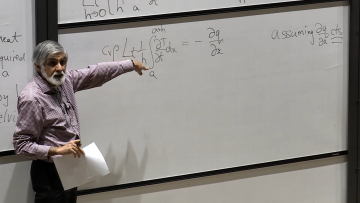Group-invariant tensor train networks for supervised learning
Abstract
Invariance under selected transformations has recently proven to be a powerful inductive bias in several machine learning models. One class of such models are tensor train networks. In this talk, we impose invariance relations on tensor train networks. We introduce a new numerical algorithm to construct a basis of tensors that are invariant under the action of normal matrix representations of an arbitrary discrete group. This method can be up to several orders of magnitude faster than previous approaches. The group-invariant tensors are then combined into a group-invariant tensor train network, which can be used as a supervised machine learning model. We applied this model to a protein binding classification problem, taking into account problem-specific invariances, and obtained prediction accuracy in line with state-of-the-art invariant deep learning approaches. This is joint work with Brent Sprangers.


